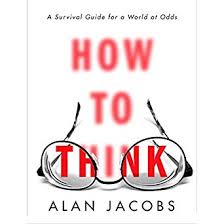Defeater Language and Critical Thinking
The habit of reflexively affirming current evolutionary theory is inculcated into new generations of students, too. For example, in a section on protein structure in a college biochemistry textbook we read:
Keep in mind that only a small faction of the myriads of possible [protein] sequences are likely to have unique stable conformations. Evolution has, of course, selected such sequences for use in biological systems.
Note that jaunty ‘of course.’ Yet we don’t have anywhere near sufficient experimental evidence for the book’s conclusion. The authors’ confidence isn’t based on empirical knowledge––it’s feigned knowledge. An unembellished second sentence would read plainly, ‘Such sequences are used in biological systems.”
Gratuitous affirmations of a dominant theory can mesmerize the unwary. They lull people into assuming that objectively difficult problems don’t really matter. That they’ve been solved already. Or will be solved soon. Or are unimportant. Or something. They actively distract readers from noticing an idea’s shortcoming. ‘Of course,’ students are effectively prompted, ‘everyone knows what happened here––right? You’d be blind not to see it––right?’ But the complacency isn’t the fruit of data or experiments. It comes from the powerful social force of everyone in the group nodding back, ‘Of course!’
When references to it can be dropped from explanations with no loss of information, when proffered evidence for it boils down to a circle of mutually nodding heads, alarm bells should blare that the theory is a free rider.
---Michael Behe, Darwin Devolves, 24-25.
Whether one agrees with Behe’s theory of intelligent design or not, this passage from his 2019 book, Darwin Devolves: The New Science About DNA that Challenges Evolution, is worthy of consideration for those that claim to seek truth.
The finiteness of the human experience requires that we absorb certain assumptions on faith. William Clifford famously claimed that accepting something as true with insufficient evidence was morally wrong. His exaggerated bid for empiricism, however, is simply impossible. We simply lack the time, energy, and objectivity to evaluate all truth claims exhaustively.
And yet, there are times when falling into the habit of accepting a consensus understanding of something can be decidedly unhelpful. At times, advances in technology and society are held back because “everyone knows” that something is true. Everyone knew that darker skin meant an inferior person through much of the early modern period. There was apparent evidence in the “primitive” quality of African culture, for example. But more often, the point was assumed in Western cultures rather than proved in more than a cursory way.
Cursory proof often takes the form of appeals to consensus to fill in limited available information, creating the image of a comprehensive and convincing argument. As Behe points out, these arguments are often much less convincing when they are presented without the logical “defeaters.”
Words like “obviously,” “of course,” and “clearly” can be useful rhetorical terms. There are points at which the evidence is so consistent that one can claim that something “clearly” indicates something else. But these are also dangerous terms that can be used to defeat sound arguments without engaging them.
When an expert in the field states that “clearly” something must be true. Or that “obviously” this leads to that, they might be skipping some important evidence. Or––a popular tactic among revisionist biblical scholars––“the best scholars argue” for a particular position they are often trying to subvert a really contentious debate by presenting a certain way of thinking as “best” when it simply agrees with their position. Orthodox biblical scholars sometimes do the same thing, of course, dismissing valuable readings from revisionist scholars without fully considering them simply because the individual does not approach the Bible as an authentic testimony to God’s working in history; that presumption does have significant impacts on the resultant reading of Scripture, but—as the saying goes—sometimes a blind squirrel finds a nut.
In any case, it’s worth thinking about the way arguments are put on display and the amount of defeater language that is used. It should raise red flags in our minds when we read “obviously,” “clearly,” or “certainly” in places where they are not needed. It may be that the author is conveying a greater amount of confidence than the evidence warrants.














There’s no reason to doubt that Jesus was nailed to the cross. Ultimately, I trust what Scripture says about Jesus’s crucifixion because I also trust what it says about his resurrection. And that’s what we should be celebrating this week.